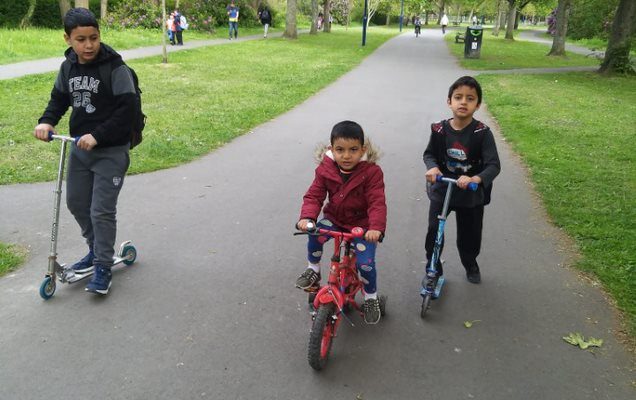Opinion: Let’s never allow the deadly impact of war to become normalised
As families flee and humanitarians race to help, what can the rest of us do?
13.07.24
As humanitarian law is flouted worldwide, UK for UNHCR CEO Emma Cherniavsky shares her reflections on holding powers to account and taking action to protect refugees.
As we take in the horrific aftermath of more missile strikes across Ukraine and beyond, the toll of war on civilians is yet again relentless and indiscriminate.
Who can fail to be moved by images of children, some still clutching their intravenous lines, picking their way through the rubble of a destroyed hospital?
In Ukraine, Sudan, Gaza, Myanmar and beyond – war and violence continues to deliver the greatest blows to the most vulnerable. More and more, international humanitarian law and the obligation to protect civilians from violence are disregarded.
View this post on Instagram
Hospitals and homes destroyed. Schools rendered unsafe. The fabric of daily life torn apart in a matter of minutes, leaving communities without water, food, sanitation, electricity, roads…and safety.
Caught in the crossfire, families are left with split second choices – when to flee, what to pack, where to go.
UNHCR, the UN Refugee Agency, is not standing still in the face of this challenge.
UN High Commissioner for Refugees, Filippo Grandi, recently addressed the UN Security Council and demanded more action in the face of humanitarian laws being breached:
“It is a grim political landscape the one I see…from my humanitarian viewpoint: short sighted foreign policy decisions, often founded on double standards, with lip service paid to compliance with the law, but little muscle flexed even from this Council to actually uphold it…”
He went on to implore the Security Council to work more as a unified voice to address the “cacophony of chaos” around the world.
Far away from this chamber, humanitarian staff are working day and night to keep relief flowing, often at great personal risk. Years of cuts to aid budgets have warning lights flashing red.
And every minute, someone is deciding what precious belongings will fit into a carry bag and where to flee, joining 117 million people worldwide already displaced by war and persecution.
So as families flee and humanitarians race to deliver relief, the question is what can the rest of us do?
Governments can’t do everything. As citizens, business leaders, community leaders, faith groups – there is much power and potential in our collective efforts. Every act of kindness matters, we can all play our part here.
The response of our supporters last week to help rush aid to survivors of the latest Russian attacks in Ukraine was extraordinary and heartfelt. It showed the power of compassion and humanity to have real impact, when it is needed most.
So if you would like to support people fleeing conflict and persecution, here are five ways you could help today:
- Donate. This is the quickest and most direct way to help humanitarian teams deliver to the people who need it most.
- Call it out. If you come across misinformation, racism and discrimination, don’t let pass. Speak out, start a dialogue, be a champion for refugees.
- Mobilise your networks. Become an advocate, join a sporting challenge, take a sponsored walk or host a fundraiser. We can help with ideas.
- Partner with us. Do you have resources or expertise that could support humanitarian programmes? Join our growing coalition of emergency partners across the UK private sector who help refugees.
- Stay informed. Sign up and we’ll keep you informed of new campaigns and stories through email.
Let’s never allow the deadly impact of war on civilians to become normalised. Families fleeing conflict can’t look the other way – and neither must we.




